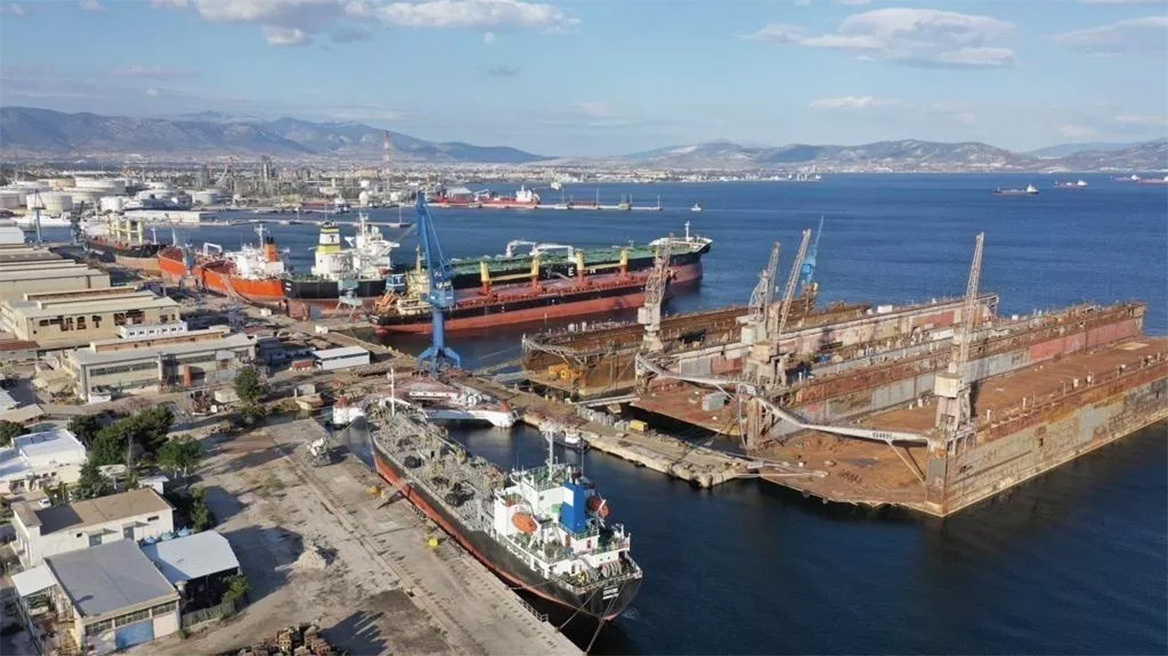The historic facilities in Elefsina, Syros, Salamis, and Skaramagas, which for years had fallen into industrial disuse, are now experiencing a dynamic revival, laying the foundations for a new era in the country’s heavy industry. The entry of private investors, the restructuring of their administrative frameworks, and the growing international demand for shipbuilding and repair services, combined with the European defense program SAFE, have created a momentum reminiscent of the sector’s most productive decades.
The Skaramagas Shipyards, under the control of shipowner Giorgos Prokopios since March 2023, have been transformed into a hub of reconstruction, aiming to restore their position at the top of the international ship repair market. At the same time, the facilities in Syros and Elefsina, operated by ONEX Shipyards & Technology under Panos Xenokostas, are evolving into modern, outward-looking industrial centers. Annual repairs have exceeded 220, while their investment plans include the construction of new vessels, energy platforms, and specialized LNG carriers.
The Salamis Shipyards constitute one of the most dynamic pillars of the Greek shipbuilding industry. Through their participation in the construction of the FDI HN frigate “Formion” and two additional vessels for the French Navy, they became the first Greek unit to export naval shipbuilding equipment. By investing in a five-year program worth €15 million and holding high-quality certifications, they are expanding their activities through international collaborations, research projects for unmanned vessels, and participation in the “national ship” program. With expertise comparable to leading European shipyards, they have the potential to become a central player in both the Greek and international shipbuilding markets.
According to Hellenic Statistical Authority (ELSTAT) data, ship repairs in Greek shipyards more than doubled over the past decade—from 330 in 2013 to 700 in 2024. This recovery is already generating tangible social impacts: hundreds of workers are returning to the docks and workshops, while dozens of smaller companies and subcontractors are now operating at full capacity. As the Mayor of Perama, Giannis Lagoudakos, notes, “The city is thriving again; we now need more roads and parking spaces to accommodate the increased traffic.”
A key driver of this renewed trajectory is the European SAFE program (Security Action for Europe), with a total budget of €150 billion, which provides member states with long-term, low-interest loans for joint procurement and investments in critical defense capabilities. For Greece, an amount of €787.6 million has been approved, which can substantially strengthen the domestic defense and shipbuilding industry, upgrade infrastructure, and support participation in European production programs. As the President of the Piraeus Chamber of Commerce and Industry (EBEP), Vasilis Korkidis, emphasizes, “SAFE can serve as a growth lever for Greek shipyards, enhancing their participation in European programs, creating new jobs, and generating added value for the Greek economy.”
One of the most ambitious initiatives in the near term concerns the acquisition of four new submarines for the Hellenic Navy—a project expected to serve as the foundation of Greece’s naval power for the next decade. The competitive process has already attracted proposals from leading companies in Sweden, Germany, France, Italy, and South Korea. Scenarios for the implementation of the program are currently under consideration, with a strong likelihood that the new submarines will be built in Greek shipyards.
An indicative example of the sector’s expertise and growing international orientation was the launch of the FDI HN frigate “Formion” in Lorient, France, last May. Components of the vessel were manufactured at the Salamis Shipyards, marking the first export of Greek naval shipbuilding equipment. The collaboration with Naval Group highlighted the high quality and capabilities of the Greek shipbuilding industry, opening the way for new international agreements and for the participation of Greek shipyards in future programs such as the “national ship.”
The Greek authorities aim for participation in defense procurement programs to reach at least 25%, with the goal of integrating new technologies, transferring know-how, and establishing a stable production infrastructure. Through European funding instruments such as SAFE, pathways are opening for collaborations with leading European groups, ensuring access to new markets and strengthening the international position of Greek shipyards.
With investments in technological modernization, digital tools, and environmentally sustainable infrastructure, the Greek facilities are also targeting green transition and energy efficiency—areas in which they can play a leading role. The combined utilization of European funding, new defense programs, and international demand creates a particularly favorable environment for the country’s heavy industry.
Overall, this momentum marks a new era for Greek shipyards: their return to the international stage, their gradual transformation into pillars of European strategic autonomy, and the creation of high-quality jobs and added value for the Greek economy. The sector’s revival links security with development, transforming shipyards into strategic levers of national and European industrial policy.















